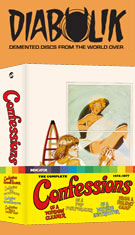

CONFESSIONS OF A WINDOW CLEANER
Color, 1974, 90 mins. 12 secs.
Directed by Val Guest
Starring Robin Askwith, Anthony Booth, Linda Hayden, Bill Maynard, Dandy Nichols, Sheila White, Joan Hickson, Melissa Stribling
CONFESSIONS OF A POP PERFORMER
Color, 1975, 90 mins. 54 secs.
Directed by Norman Cohen
Starring Robin Askwith, Anthony Booth, Doris Hare, Bill Maynard, Sheila White, Peter Cleall, Carol Hawkins, Bill Pertwee, David Hamilton
CONFESSIONS OF A DRIVING INSTRUCTOR
Color, 1976, 90 mins. 20 secs.
Directed by Norman Cohen
Starring Robin Askwith, Anthony Booth, Doris Hare, Bill Maynard, Sheila White, Windsor Davies, Liz Fraser, Irene Handl, George Layton, Lynda Bellingham, Suzy Mandel, Sally Faulkner
CONFESSIONS FROM A HOLIDAY CAMP
Color, 1977, 89 mins. 6 secs.
Directed by Norman Cohen
Starring Robin Askwith, Anthony Booth, Doris Hare, Bill Maynard, Sheila White, Colin Crompton, Liz Fraser, Linda Hayden, John Junkin, Lance Pervical
Indicator (Blu-ray) (UK RB HD), Sony (DVD-R) (US R0 NTSC) / WS (1.85:1) (16:9)
With the British 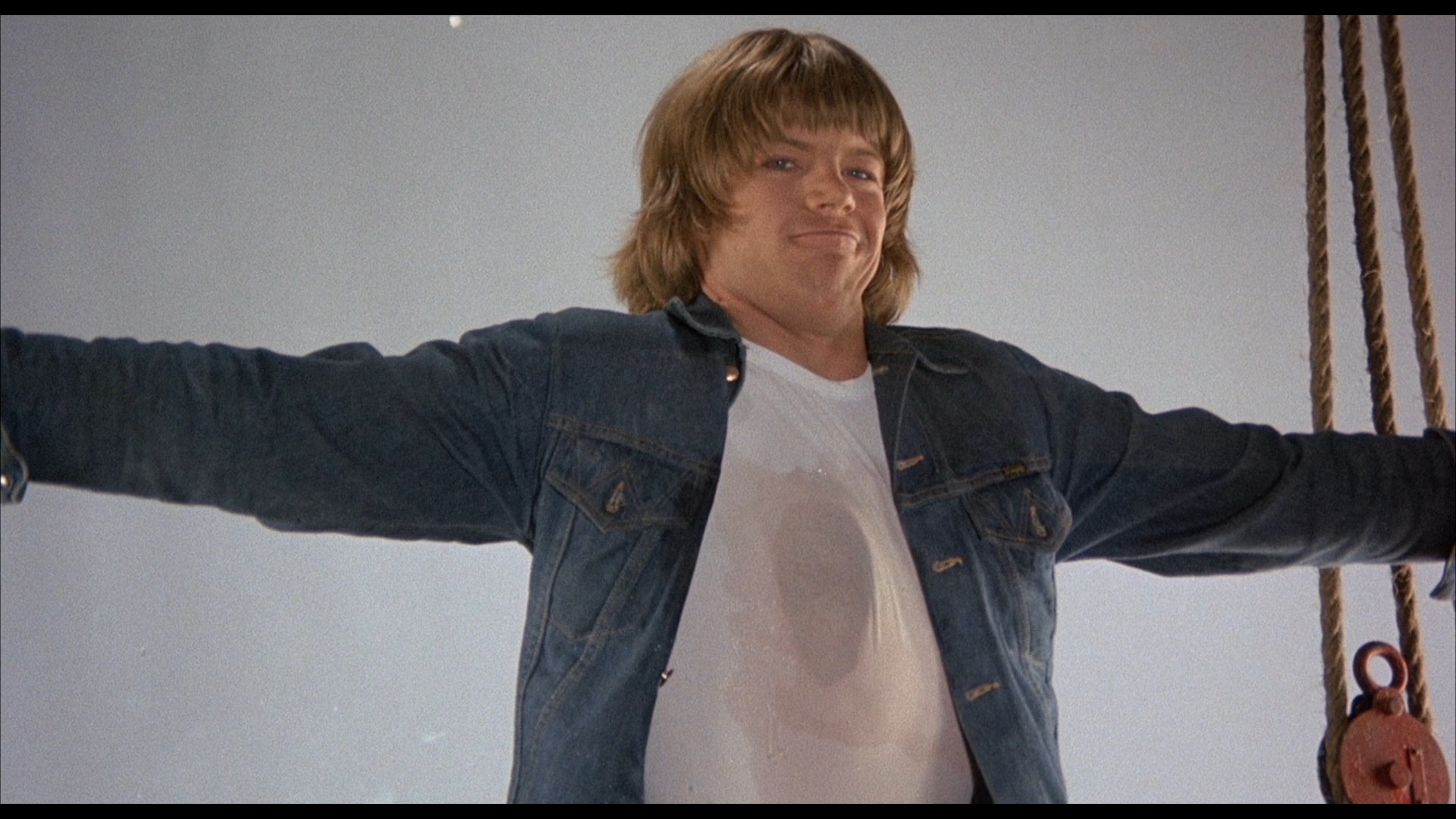 film industry in a strange state as established cash cows like the Carry On series and Hammer horrors seen as outdated, the mid-1970s was a prime time for young new talent
film industry in a strange state as established cash cows like the Carry On series and Hammer horrors seen as outdated, the mid-1970s was a prime time for young new talent 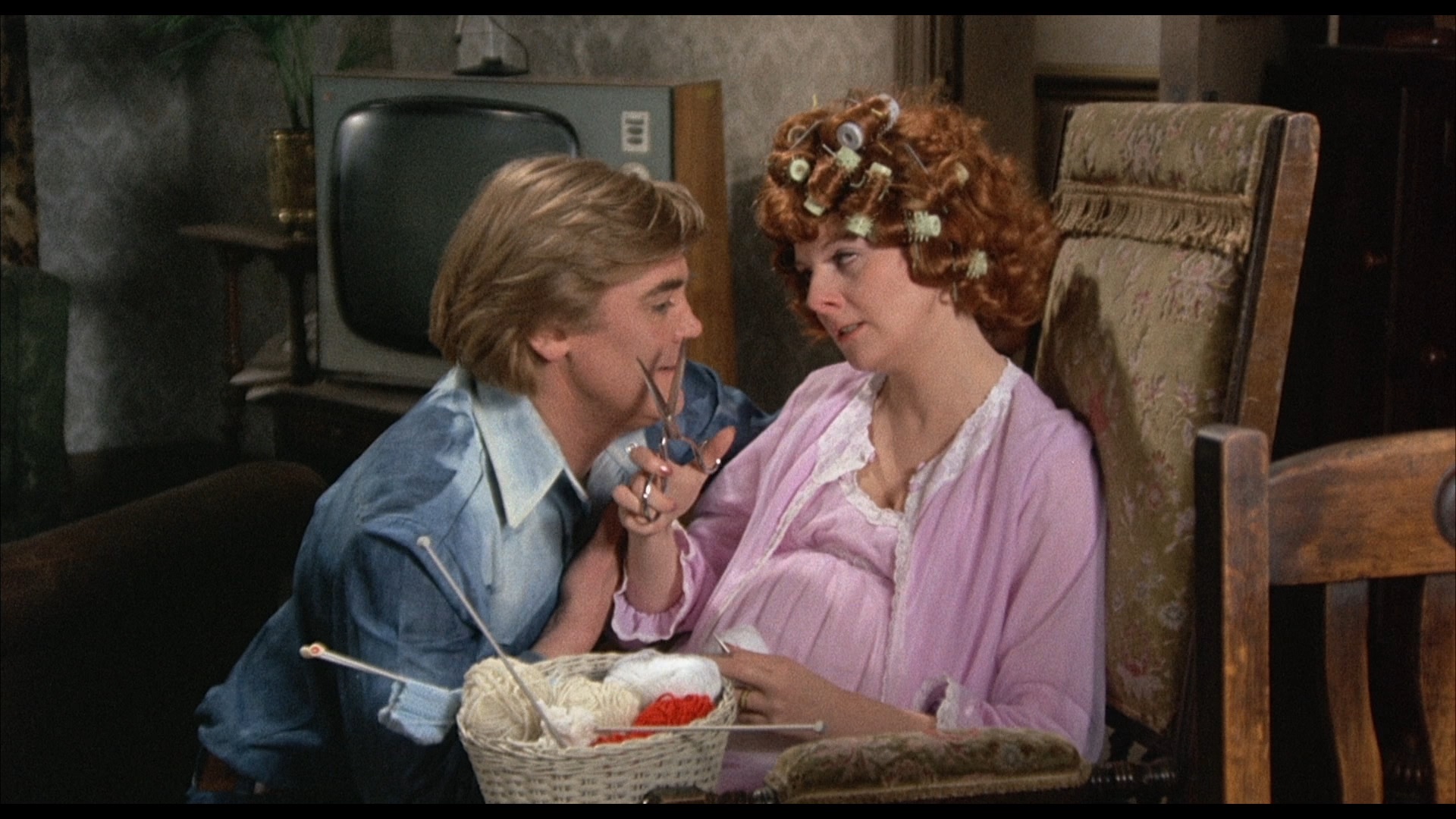 to gamble on the loosening of local and worldwide censorship. 1974 was a watershed year for softcore cinema thanks to the craze inaugurated by Emmanuelle, while the U.K. got two controversial outrages from Pete Walker, House of Whipcord and Frightmare. And then there's Confessions of a Window Cleaner, young producer Greg Smith's adaptation of a very popular sexy comedy paperback that had already spawned multiple print sequels. The books' credited author was "Timothy Lea," a working class lad whose various job exploits land him in various sexual and social predicaments along with members of his family including his enterprising brother-in-law, Sid. The books were actually the handiwork of Christopher Wood, who also wrote historical novels under his real name and would be involved in the screenplays for all four of the Confessions films that made it to the screen. The films' success also caught the eye of 007 producers who brought him on to write Roger Moore's two biggest box office successes, The Spy Who Loved Me and Moonraker, and he would go on to write Remo Williams: The Adventure Begins...
to gamble on the loosening of local and worldwide censorship. 1974 was a watershed year for softcore cinema thanks to the craze inaugurated by Emmanuelle, while the U.K. got two controversial outrages from Pete Walker, House of Whipcord and Frightmare. And then there's Confessions of a Window Cleaner, young producer Greg Smith's adaptation of a very popular sexy comedy paperback that had already spawned multiple print sequels. The books' credited author was "Timothy Lea," a working class lad whose various job exploits land him in various sexual and social predicaments along with members of his family including his enterprising brother-in-law, Sid. The books were actually the handiwork of Christopher Wood, who also wrote historical novels under his real name and would be involved in the screenplays for all four of the Confessions films that made it to the screen. The films' success also caught the eye of 007 producers who brought him on to write Roger Moore's two biggest box office successes, The Spy Who Loved Me and Moonraker, and he would go on to write Remo Williams: The Adventure Begins... 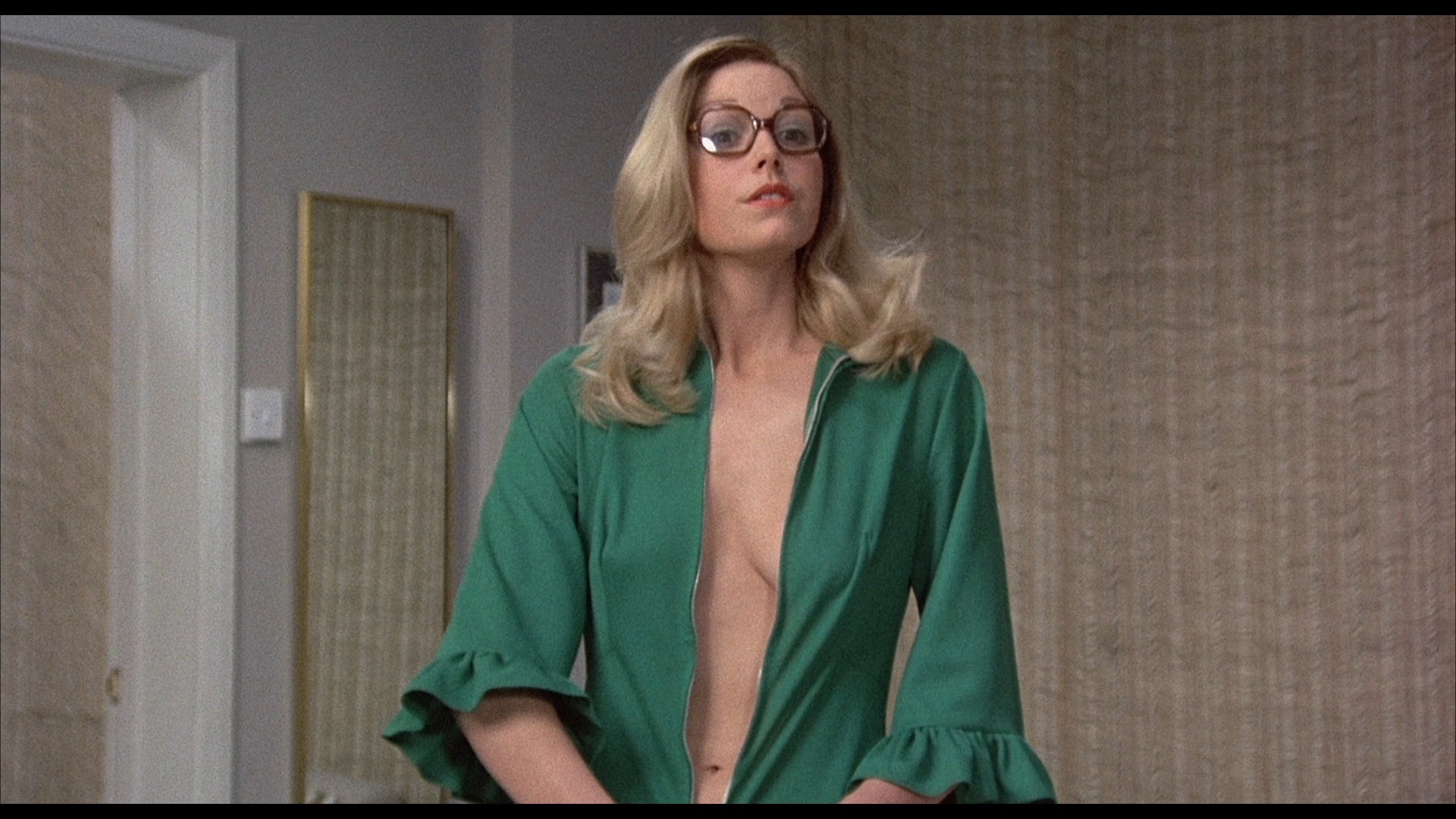 and more saucy novel series including the exploits of naughty nurse Rosie Dixon.
and more saucy novel series including the exploits of naughty nurse Rosie Dixon.
The storyline for Window Cleaner sets the template for what is to come, with 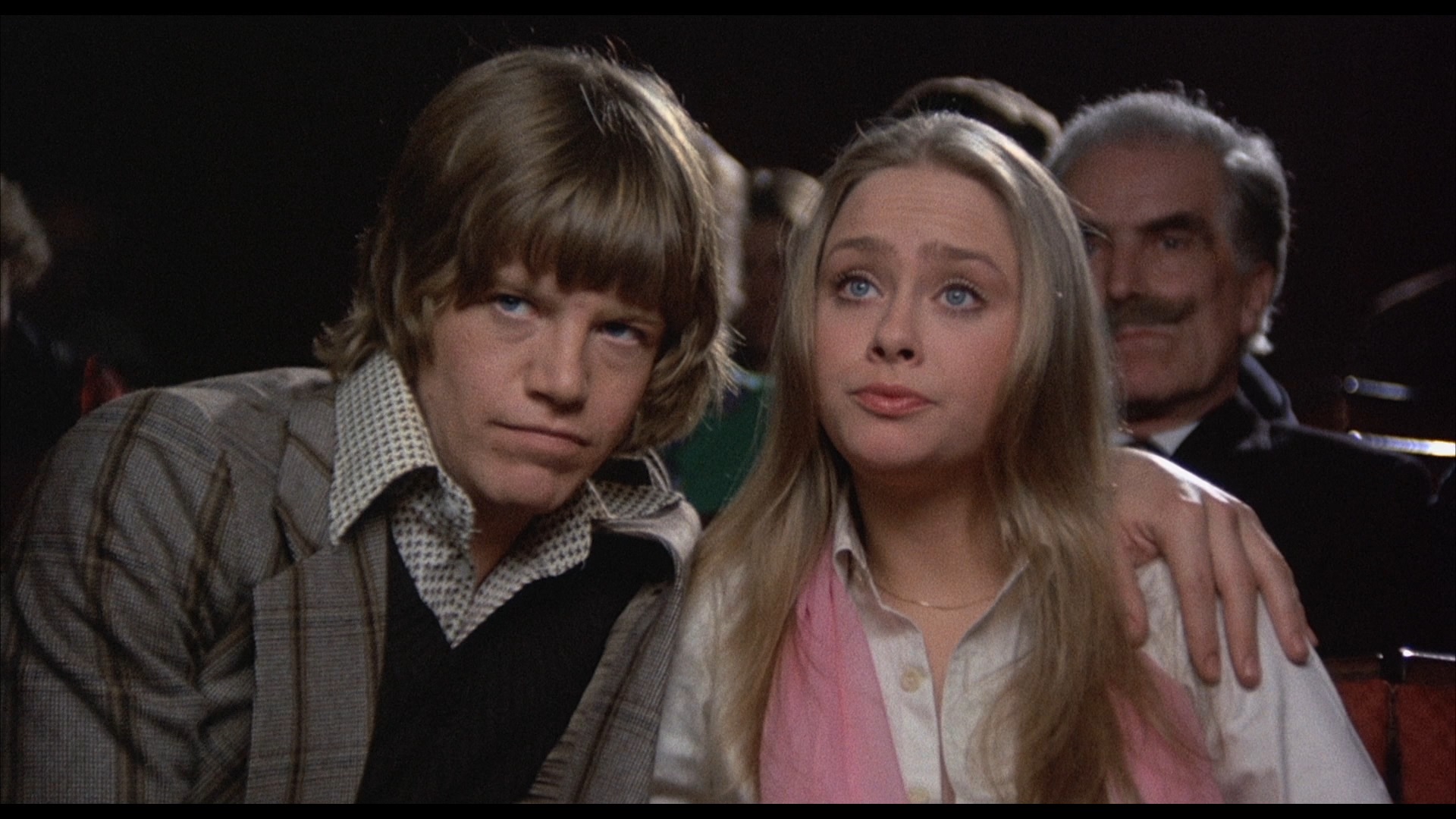 the outrageously clumsy and unlucky Timothy brought on to work for Sid's window cleaning service. Played by actor Robin Askwith hot on the heels of his role in Horror Hospital, Timothy has his eye on a gorgeous police officer, Elizabeth (Blood on Satan's Claw's Hayden), but his job puts him in the path of a wide range of sexually aggressive women whom Sid relies on to keep the company afloat. Handling directing duties here (for the only time) is none other than Val Guest, who had just proven his sexploitation mettle with Au Pair Girls but was responsible for numerous Hammer films and had survived the chaos of 1967's Casino Royale. This wasn't even close to the first major British sexy comedy for the youth market; that honor probably goes to 1967's Here We Go Round the Mulberry Bush, with a few in between like the notorious Percy from 1971. However, Confessions was a different animal entirely with its wild slapstick, verbal puns, and surprisingly dark portrayal of working class struggles all carried by Askwith's very game performance. Not even close to a heartthrob type like Mulberry's Barry Evans, he was an average guy who would presumably be unthreatening to both male and female viewers. The film also benefited from the participation of a major American studio, Columbia Pictures (who also handled Emmanuelle in the U.S.), and its success spawned a wave of competitors including Stanley Long's Adventures of a Taxi Driver and its sequels, Mary Millington's star
the outrageously clumsy and unlucky Timothy brought on to work for Sid's window cleaning service. Played by actor Robin Askwith hot on the heels of his role in Horror Hospital, Timothy has his eye on a gorgeous police officer, Elizabeth (Blood on Satan's Claw's Hayden), but his job puts him in the path of a wide range of sexually aggressive women whom Sid relies on to keep the company afloat. Handling directing duties here (for the only time) is none other than Val Guest, who had just proven his sexploitation mettle with Au Pair Girls but was responsible for numerous Hammer films and had survived the chaos of 1967's Casino Royale. This wasn't even close to the first major British sexy comedy for the youth market; that honor probably goes to 1967's Here We Go Round the Mulberry Bush, with a few in between like the notorious Percy from 1971. However, Confessions was a different animal entirely with its wild slapstick, verbal puns, and surprisingly dark portrayal of working class struggles all carried by Askwith's very game performance. Not even close to a heartthrob type like Mulberry's Barry Evans, he was an average guy who would presumably be unthreatening to both male and female viewers. The film also benefited from the participation of a major American studio, Columbia Pictures (who also handled Emmanuelle in the U.S.), and its success spawned a wave of competitors including Stanley Long's Adventures of a Taxi Driver and its sequels, Mary Millington's star 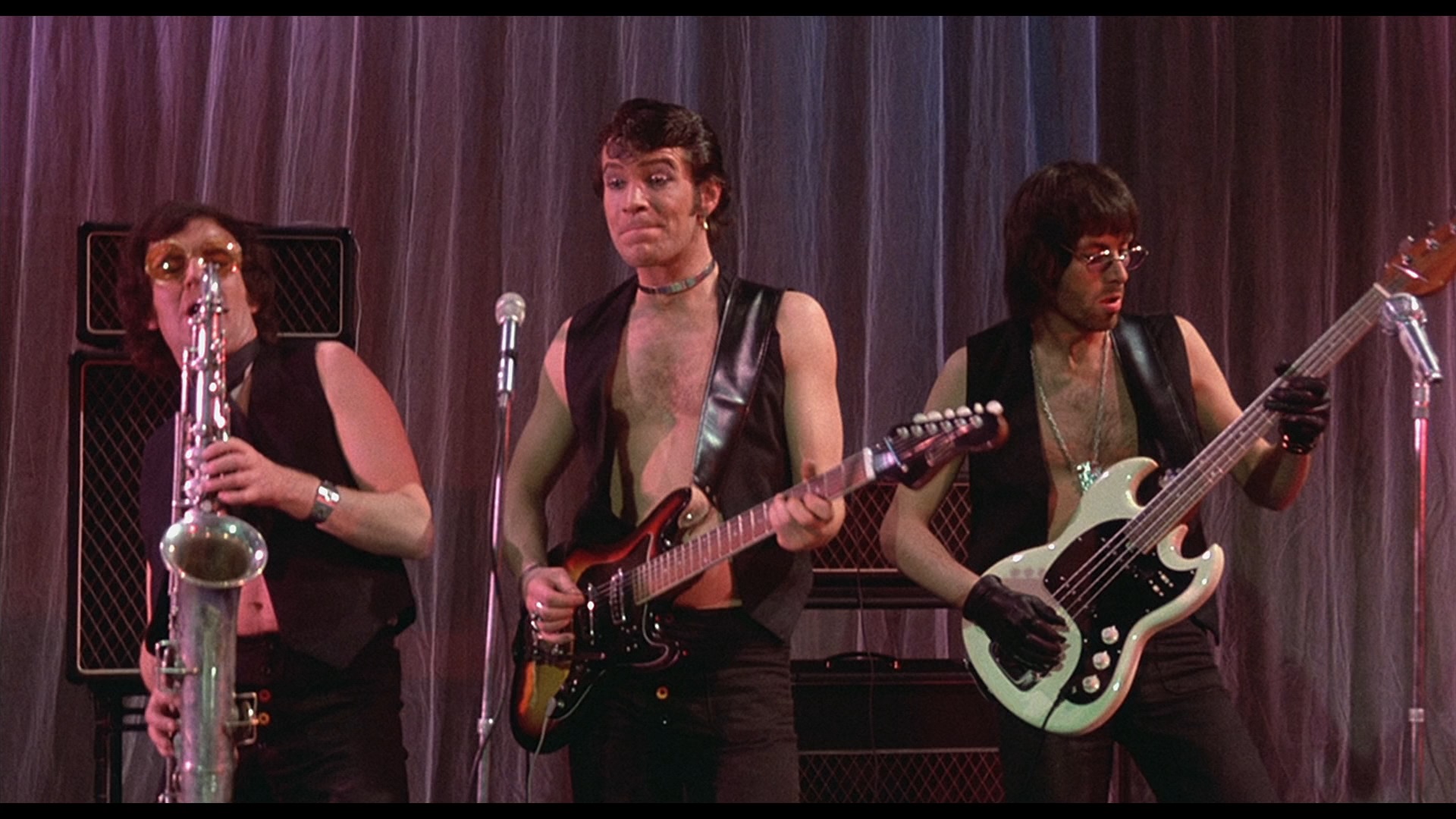 vehicles including
vehicles including 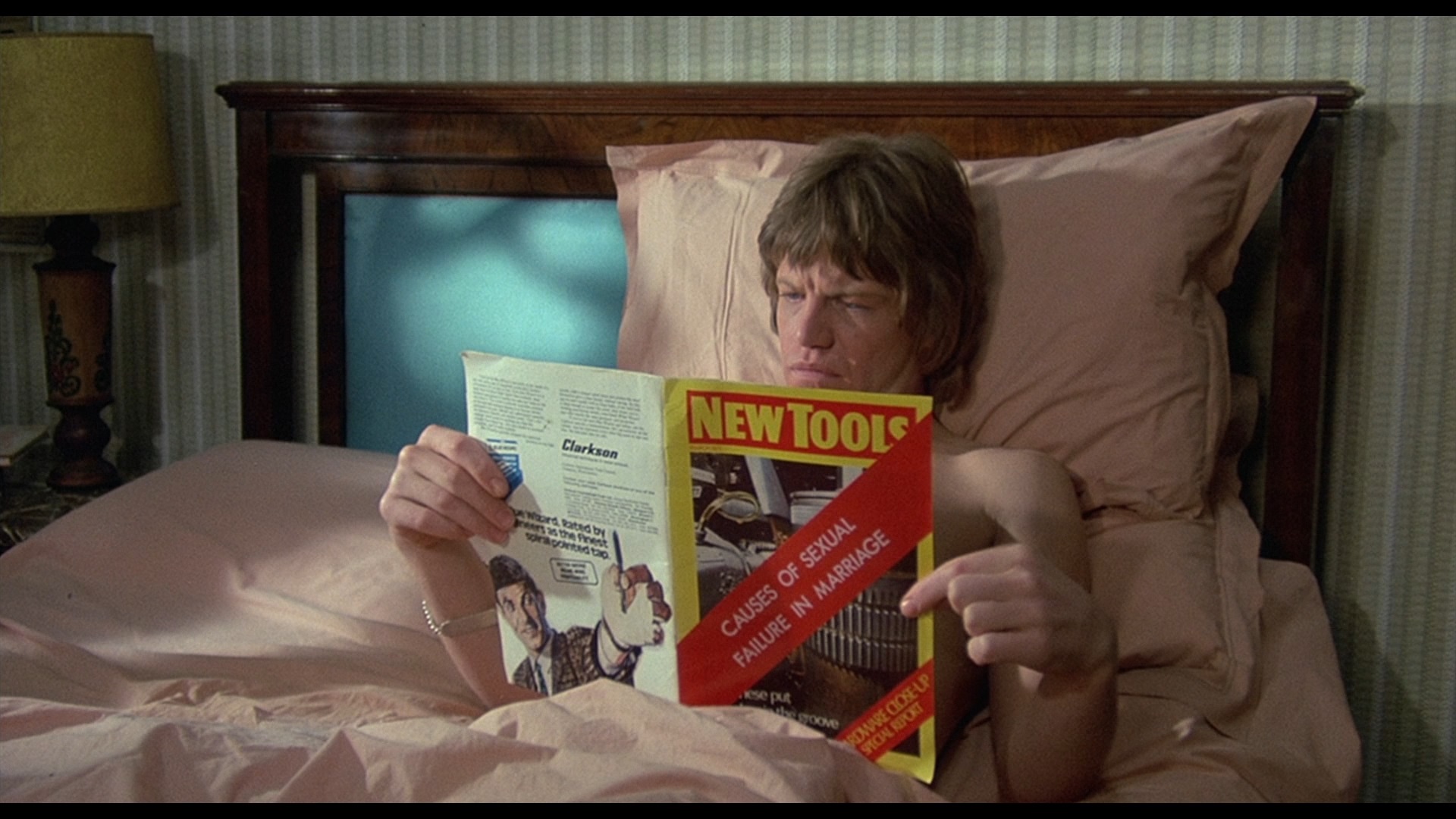 the blockbuster Come Play with Me, and one-offs like Secrets of a Door-to-Door Salesman and The Ups and Downs of a Handyman. All of these were despised by critics at the time, but audiences ate them all up with Confessions leading the pack.
the blockbuster Come Play with Me, and one-offs like Secrets of a Door-to-Door Salesman and The Ups and Downs of a Handyman. All of these were despised by critics at the time, but audiences ate them all up with Confessions leading the pack.
The following year's Confessions of a Pop Performer delivers exactly what you'd expect, namely Timothy and Sid getting mixed up in British music scene with a few original songs thrown in to justify a soundtrack LP. That was a logical choice given the use of the infectious theme song "This Is Your Life, Timmy Lea" in the first film, and here the justification comes with Sid catching a local band at the pub and deciding it's time to get into music management instead of cleaning windows. For reasons too unlikely to chronicle here, Timothy gets recruited as 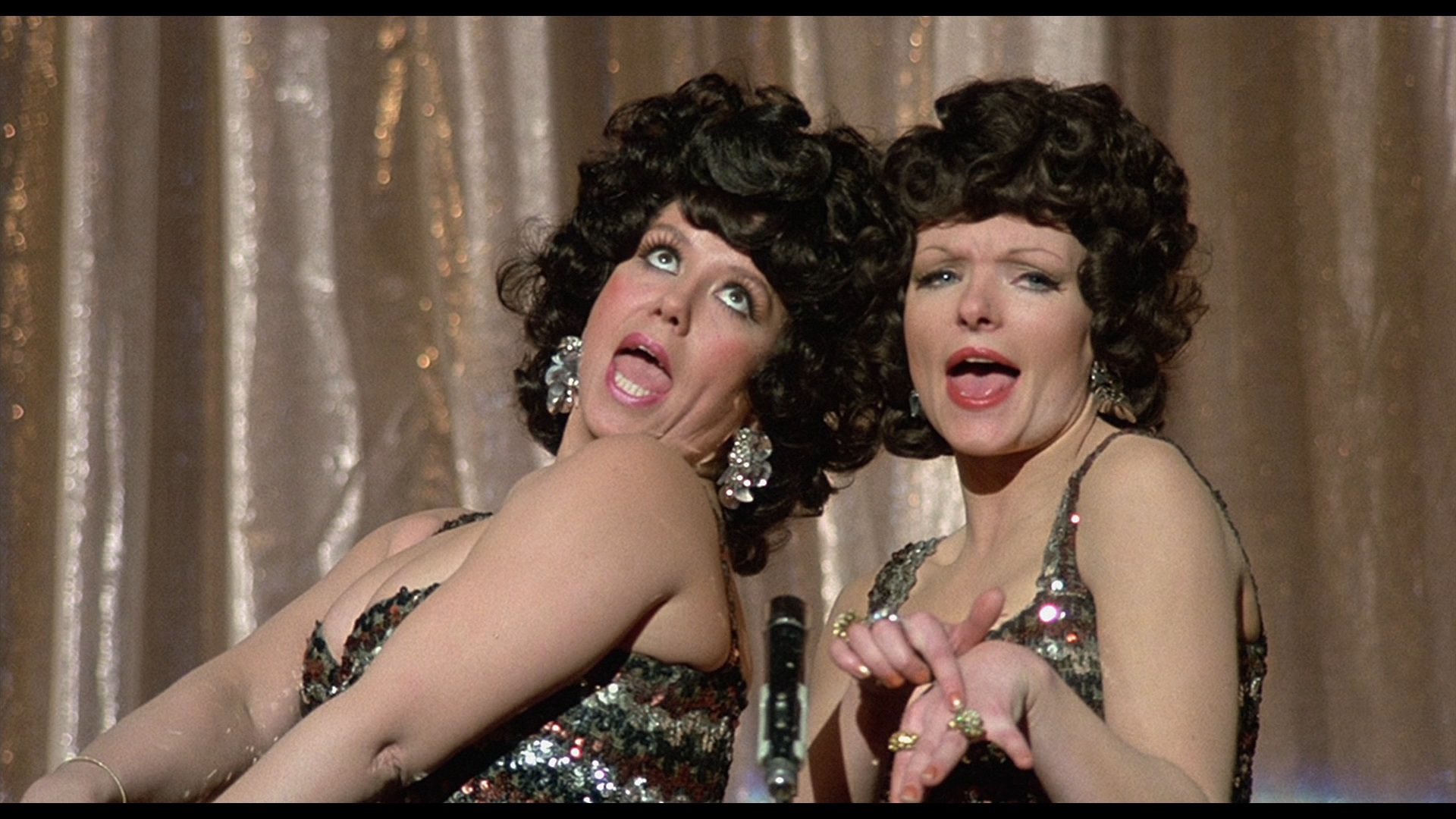 the band's drummer in between various near-sexual escapades with groupies.
the band's drummer in between various near-sexual escapades with groupies.
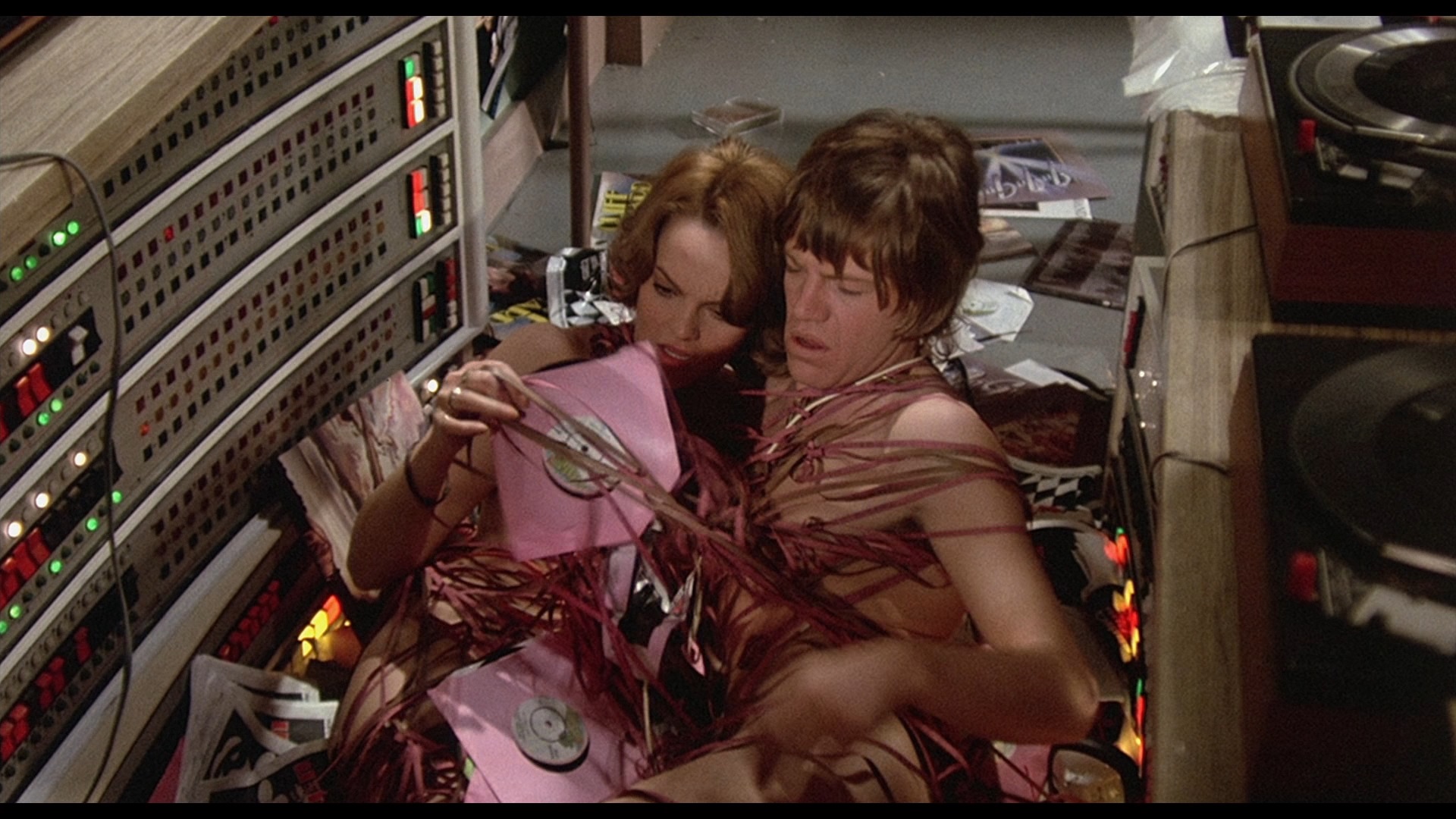 While the prior film had a few unexpected guest stars like future Miss Marple Joan Hickson and Horror of Dracula's Melissa Stribling, this is the only one to feature lesser wattage thespians but has two fun music acts: the main one driving the store, the Kippers (including Askwith's onetime if... costar, Richard Warwick), and the Climax Sisters, played by British TV vets Diane Langton and Linda Regan. This time directing chores went to Norman Cohen (Dad's Army), who would helm the remaining two entries as well (with Guest still getting a cut thanks to his smart compensation deal). From a pop culture perspective this is still the most fascinating film in the series, capturing a mainstream perception of the music scene in post-Beatles Britain where a music hall mentality still hangs over the proceedings. Plus you get to see Askwith clumsily trying to play the drums, which is
While the prior film had a few unexpected guest stars like future Miss Marple Joan Hickson and Horror of Dracula's Melissa Stribling, this is the only one to feature lesser wattage thespians but has two fun music acts: the main one driving the store, the Kippers (including Askwith's onetime if... costar, Richard Warwick), and the Climax Sisters, played by British TV vets Diane Langton and Linda Regan. This time directing chores went to Norman Cohen (Dad's Army), who would helm the remaining two entries as well (with Guest still getting a cut thanks to his smart compensation deal). From a pop culture perspective this is still the most fascinating film in the series, capturing a mainstream perception of the music scene in post-Beatles Britain where a music hall mentality still hangs over the proceedings. Plus you get to see Askwith clumsily trying to play the drums, which is 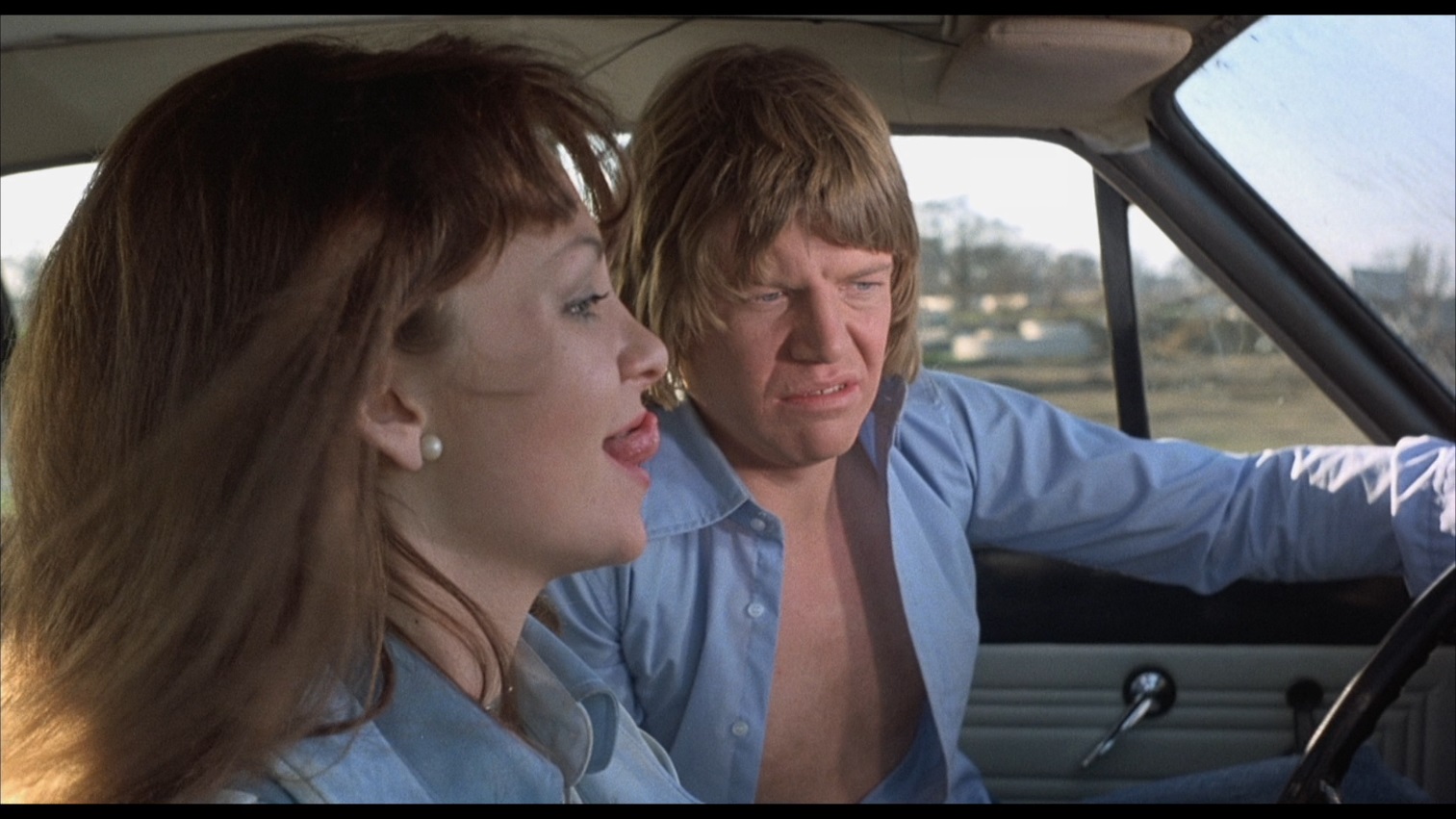 almost worth the price of admission i
almost worth the price of admission i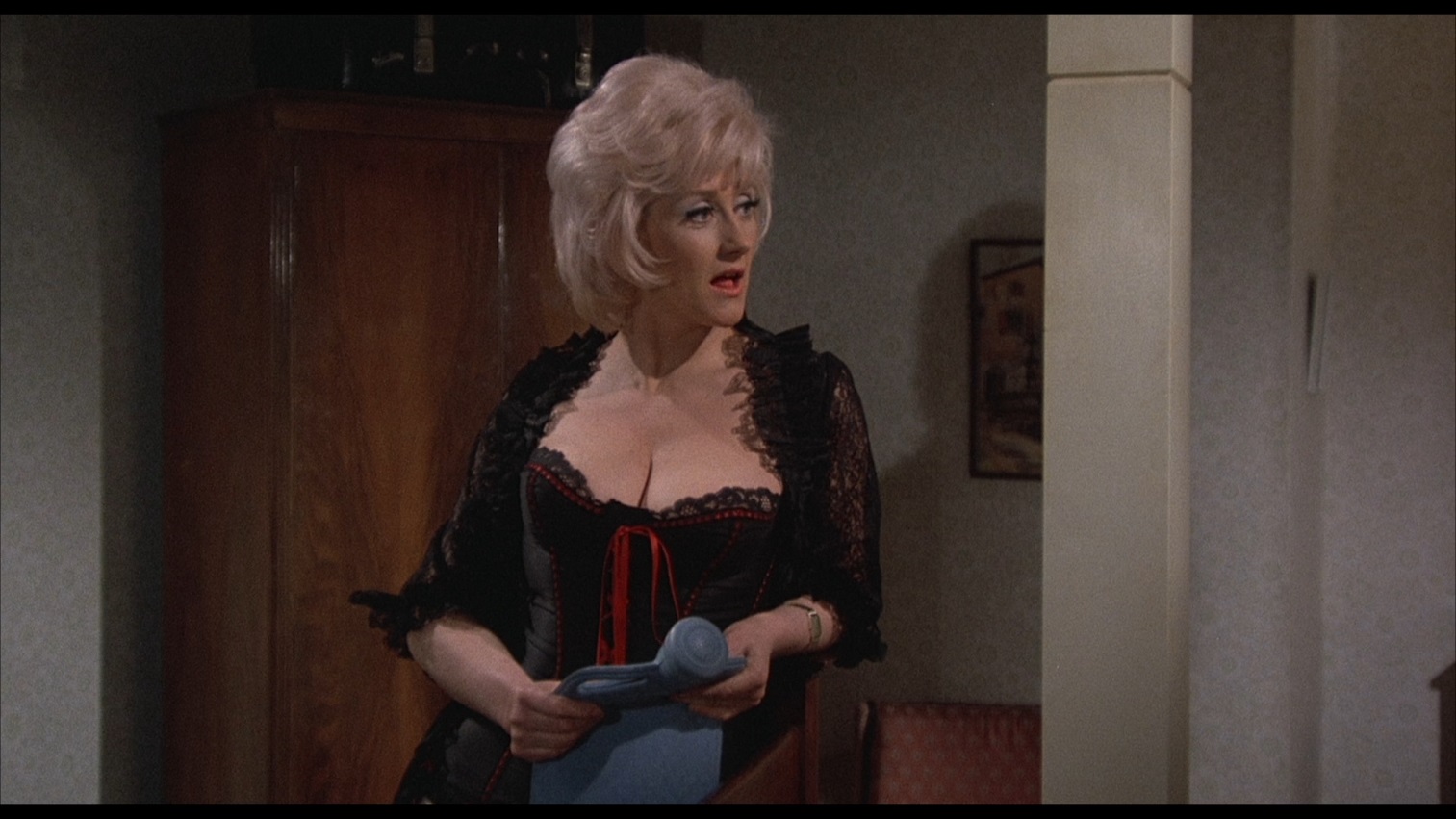 tself.
tself.
Cited by Askwith himself as his personal favorite of the series, Confessions of a Driving Instructor remains one of the most popular and received the most cable TV play in America by a long shot. Here the slapstick quotient gets upped considerably with less nudity and sex than before, which seemed to make it more marketable to a wider audience. As you'd expect, the very simple plot has Timothy and Sid recovering from their chaotic foray into music by operating a driving school with Timmy as one of the instructors. Cue the parade of women ranging from seniors to nymphets who cause him more than a little consternation, but not as much as the rival driving school that wants to shut them down. 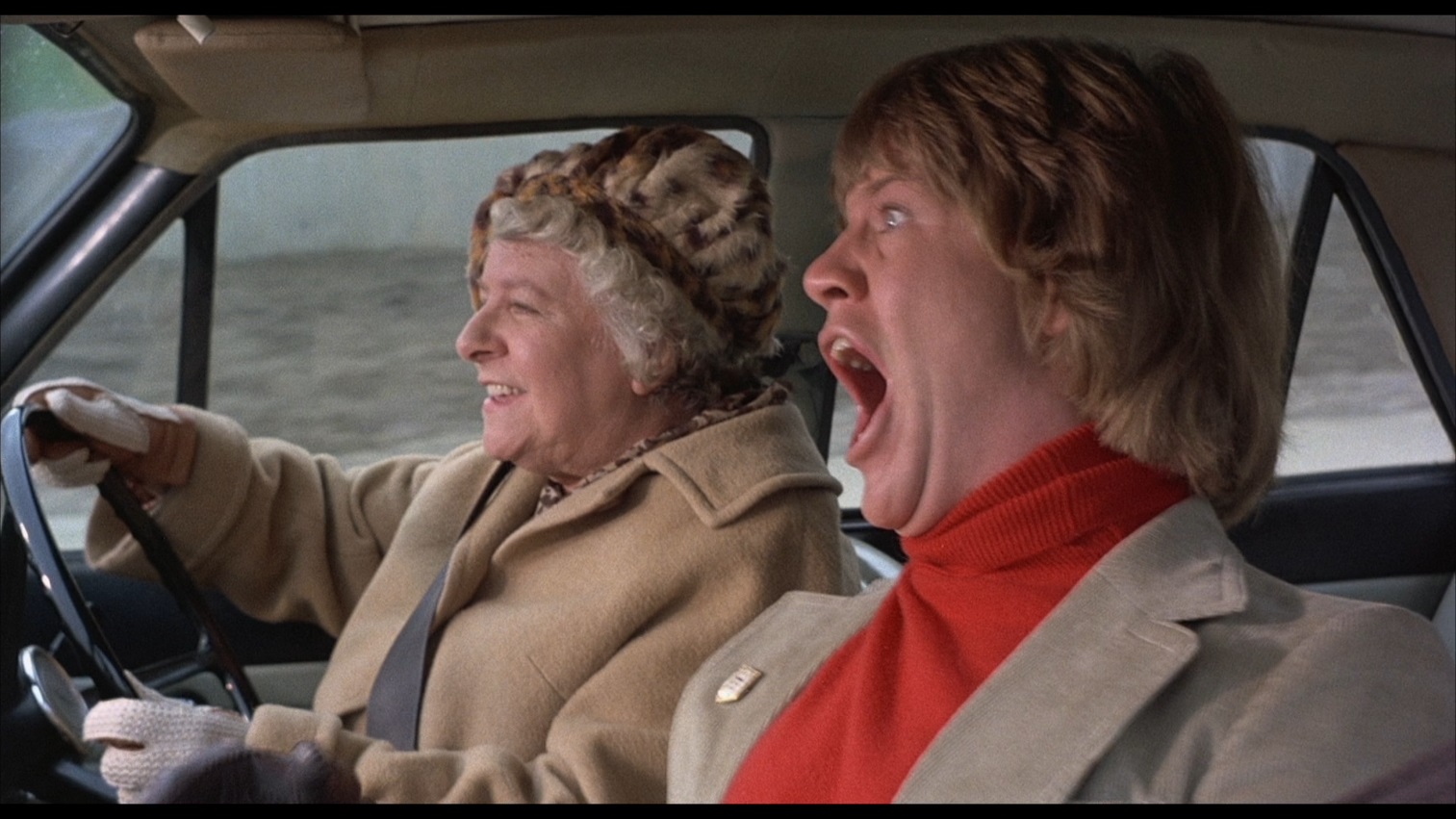 The cast is higher caliber than usual here with Windsor Davies and Liz Fraser on hand, though you also get Sally Faulkner (Prey, Vampyres) to remind you this is still exploitation at
The cast is higher caliber than usual here with Windsor Davies and Liz Fraser on hand, though you also get Sally Faulkner (Prey, Vampyres) to remind you this is still exploitation at 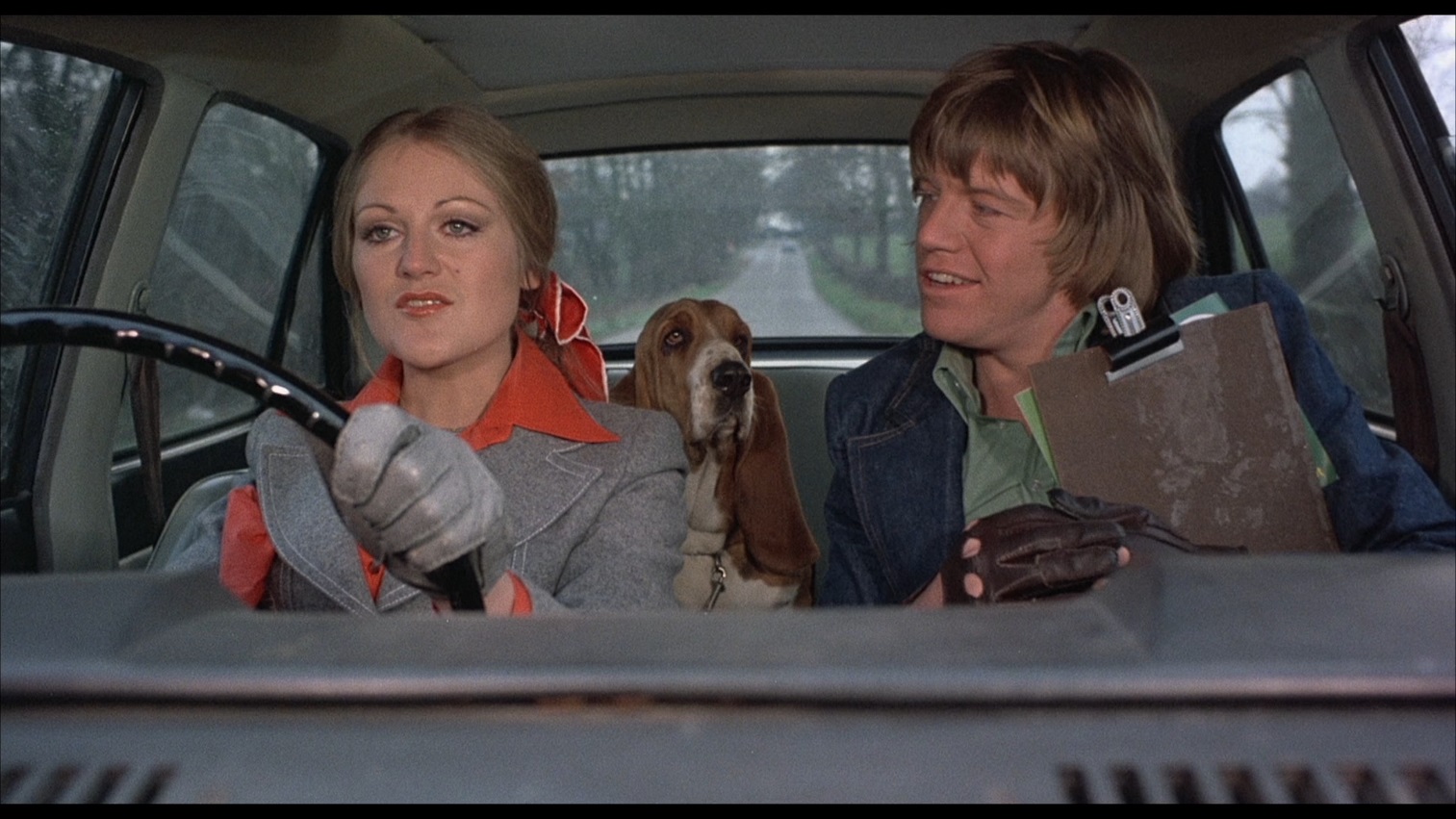 heart.
heart.
Finally the series closes out with Confessions from a Holiday Camp, which wasn't intended to be the conclusion (at least two more films were being considered at the time). That said, it still feels a little bit like a final lap for Askwith and company with Hayden making a welcome return and the sexual content tapered down here to virtually nothing. If anything it feels like a British precursor to something like Meatballs as Timothy and Sid get put in charge of the live entertainment at Funfrall camp over the summer. A totalitarian boss and lackadaisical counselors don't help them, not to mention some rambunctious kids, as they try to come up with a big stage performance that will not only justify their jobs but end the season with a real bang.
Not surprisingly, all of these films have remained readily available on home video in some form over the years in countries like the U.S., U.K., 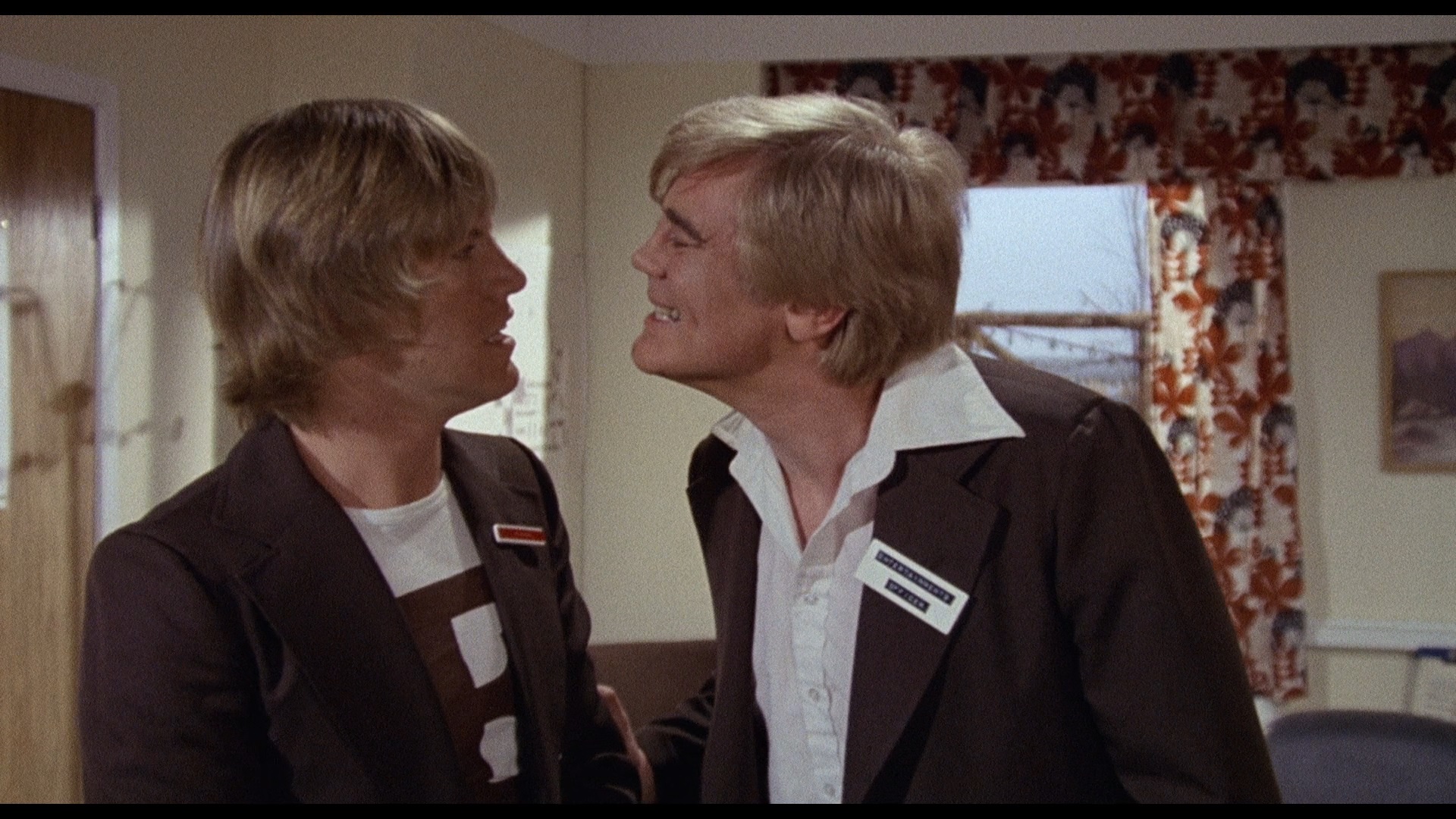 and Australia, with Sony preparing high-definition masters in the late '00s to run on its own dedicated HD movie channels. Those were sourced for DVD-R releases
and Australia, with Sony preparing high-definition masters in the late '00s to run on its own dedicated HD movie channels. Those were sourced for DVD-R releases 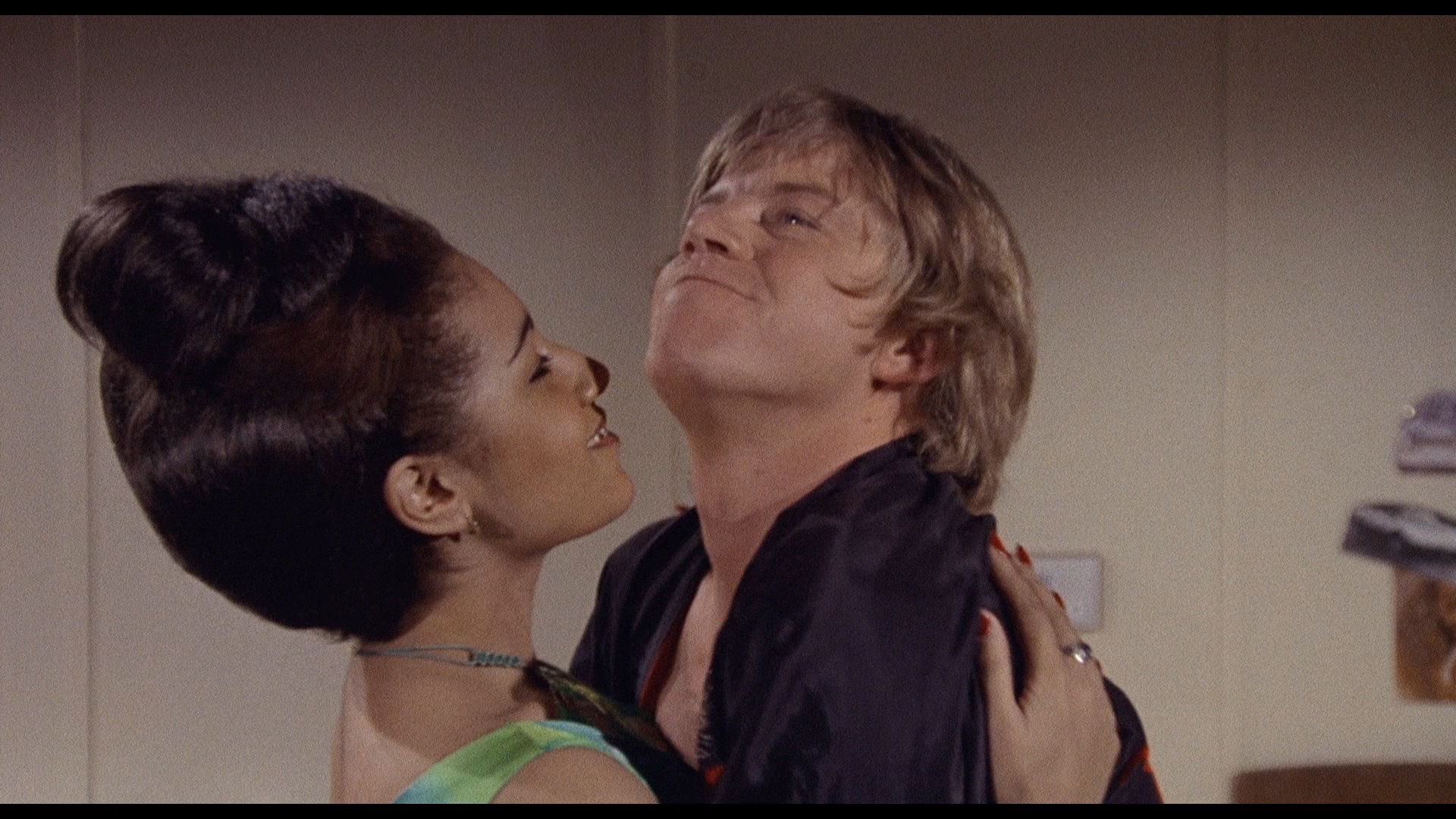 through Amazon as well, though the best option is the 2024 Blu-ray set from Indicator which lavishes them with more extras than the majority of prestige films out there. The Sony masters look great with punchy colors throughout; as always, the opticals involved in the main and end titles mean those are a little more coarse than the rest of the footage sourced right off the negatives. The LPCM 1.0 English mono tracks all sound excellent and come with improved, very handy English SDH subtitles that do everything they can with the Northern slang-riddled dialogue and nonstop wordplay. A fantastic raconteur, Askwith appears for solo commentaries for all four films and has an insane level of recall for all of them. He points out virtually all of the actors, explains why he was so tan in the last film, makes numerous bemused comments about still baring his butt on a 2024 episode of Inside No. 9, calling out moments he can't believe they got away with at the time, and generally has a great time riffing on the films that truly made him a star.
through Amazon as well, though the best option is the 2024 Blu-ray set from Indicator which lavishes them with more extras than the majority of prestige films out there. The Sony masters look great with punchy colors throughout; as always, the opticals involved in the main and end titles mean those are a little more coarse than the rest of the footage sourced right off the negatives. The LPCM 1.0 English mono tracks all sound excellent and come with improved, very handy English SDH subtitles that do everything they can with the Northern slang-riddled dialogue and nonstop wordplay. A fantastic raconteur, Askwith appears for solo commentaries for all four films and has an insane level of recall for all of them. He points out virtually all of the actors, explains why he was so tan in the last film, makes numerous bemused comments about still baring his butt on a 2024 episode of Inside No. 9, calling out moments he can't believe they got away with at the time, and generally has a great time riffing on the films that truly made him a star. 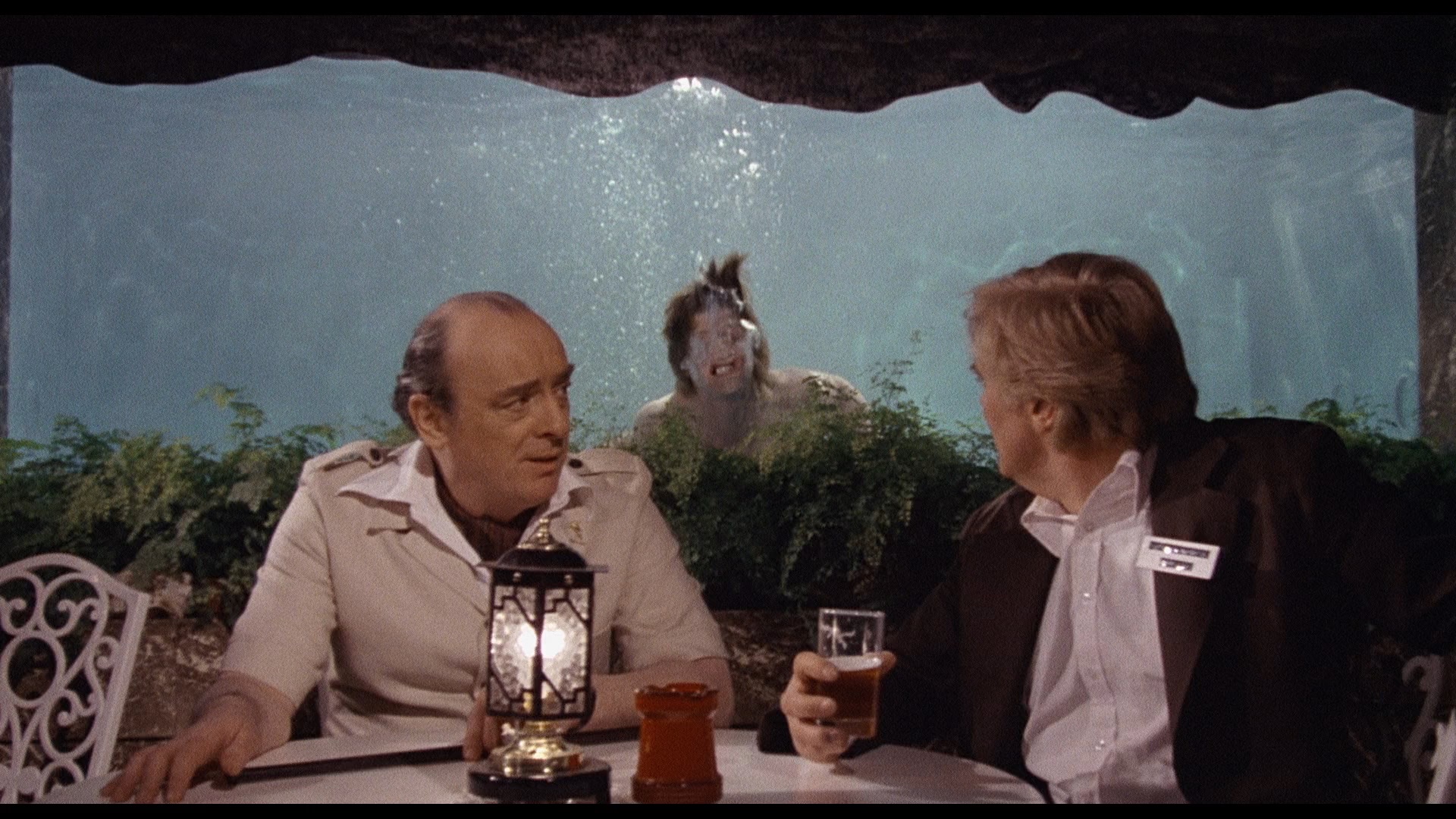 Make sure you listen to them in order as he does a fine job of threading the narrative
Make sure you listen to them in order as he does a fine job of threading the narrative 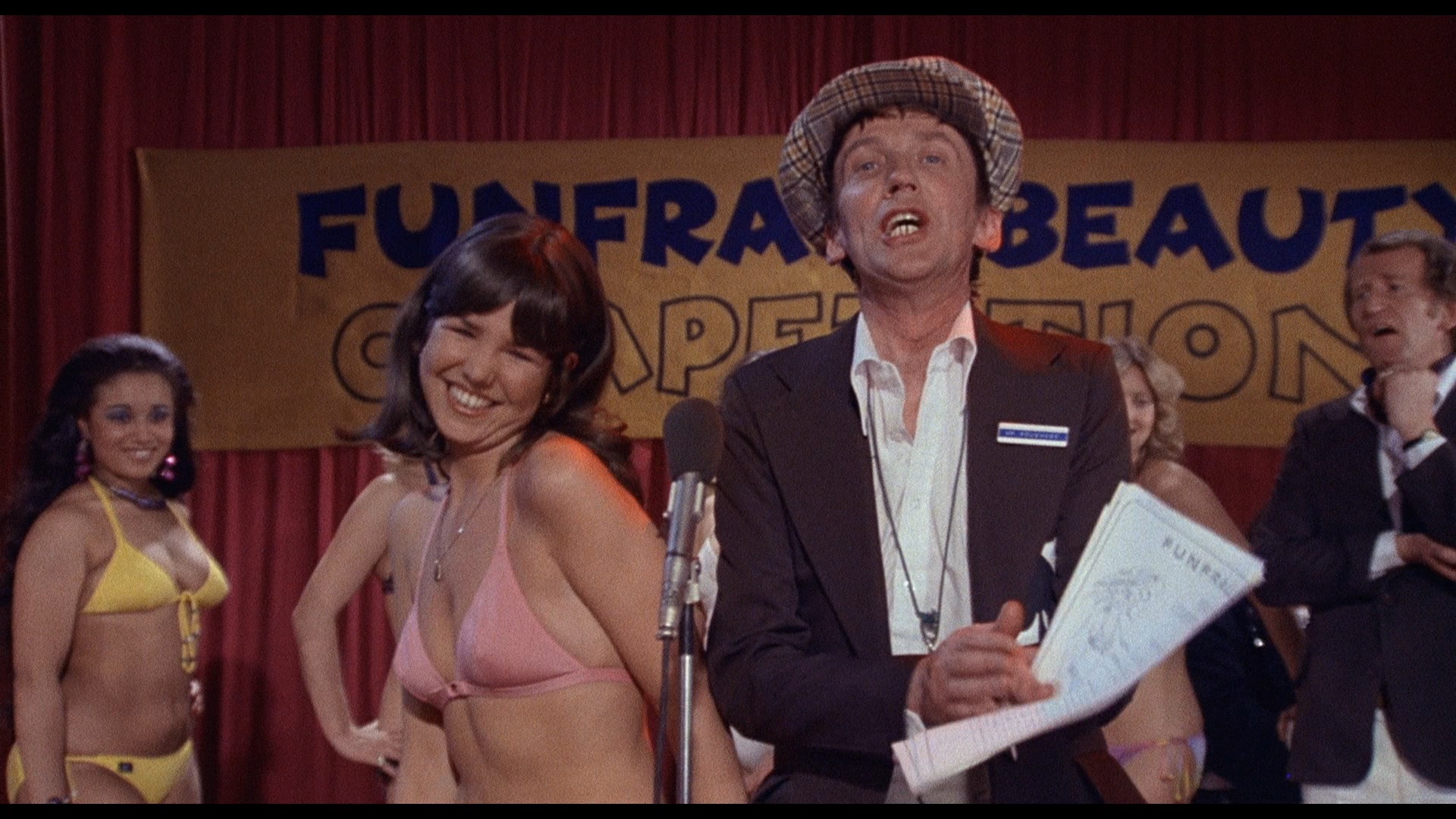 between each track.
between each track.
The disc for Window Cleaner also features an additional audio track, "The BEHP Interview with Val Guest," a 90-minute audio recording with the director covering pretty much his whole career, chatting with Roy Fowler over four separate days in 1988. In "Hey, Judy!" (16m40s), Judy Matheson talks about working with Guest and Askwith as well as the small, family-style atmosphere among the entertainment community at the time. Also included are the trailer and two galleries dedicated to promotional and publicity materials. On Pop Performer you get "Confessions of a Film Composer" (16m6s) with composer and songwriter Ed Welch, the man responsible for scoring three of the Confessions films about his great surprise at the films' success, his hiring after the first film, and the tricks to signaling an audience where to pay attention in a scene. "Team Mates" (3m47s) is a quick piece with veteran broadcaster David Hamilton about his cameo in the film ("not too many lines to remember") and his rapport with buddy Askwith. Also included are a gallery and a very clever, specially-shot trailer with Askwith teasing the new film. Driving Instructor features the amusingly titled "Cunning Stunts" (14m39s) with very busy stunt performer Laurie "Rocky" Taylor talking about his experiences working on two of the Confessions films as well as other highlights from the 200 or so films he made that involved some real-life injuries at times. (Don't miss the teddy bear bit, too.) "The BEHP Interview with Geoffrey Foot" is a 1988 archival audio recording of the editor of three Confessions films talking with Sidney Cole and Alan Lawson for 74 minutes about his career including the lessons he learned about comic timing and his ascension up the industry ladder. Also included are the two-reel Super 8 version (33m49s) of the feature, primarily of interest for being presented open matte, an extremely funny theatrical trailer, and an image gallery. Finally Holiday Camp has the surprisingly drab U.K. and U.S. trailers (the latter as Confessions of a Summer Camp Counsellor) and an image gallery, but you also get an entire bonus feature film: 1978's Rosie Dixon – Night Nurse (87m44s), the only screen adaptation from Christopher Wood's female version of the Confessions formula. Directed by Justin Cartwright and featuring some familiar faces including Beryl Reid, it's an extremely formulaic hospital sex comedy with Debbie Ash starring as the titular nurse who, along with frequently undressed colleague Penny (Caroline Argyle), has to deal with an assortment of grabby patients and administrators. It's comparatively lifeless next to the main series here, but at least this rare item is here for posterity taken from a 1.33:1 (open matte) standard def source. A VHS-sourced trailer for this one is also included, plus"Saucy Ingredients" (6m58s) with casting director Esta Charkham discussing Rosie Dixon – Night Nurse and the "alumni" approach to finding actors for these films who were associated with prior ones and carried a certain familiarity, with Reid being the one who led to the rest on this one. The limited edition set comes with a 120-page book including a thorough and often very funny "True Confessions" essay by Simon Sheridan, a 1975 interview with Greg Smith, a 1976 profile of a film student on the Driving Instructor set, a 1976 profile of executive producer Michael Klinger, a 1976 article on Wood, a compendium of interview extracts with Cohen, a 1976 interview with Askwith, a 1975 profile of actress Sheila White, a 1974 article on Hayden, a 1978 interview with Askwith, and an overview of making-of coverage of Rosie Dixon.
Reviewed on September 18, 2024




 film industry in a strange state as established cash cows like the Carry On series and Hammer horrors seen as outdated, the mid-1970s was a prime time for young new talent
film industry in a strange state as established cash cows like the Carry On series and Hammer horrors seen as outdated, the mid-1970s was a prime time for young new talent  to gamble on the loosening of local and worldwide censorship. 1974 was a watershed year for softcore cinema thanks to the craze inaugurated by Emmanuelle, while the U.K. got two controversial outrages from Pete Walker, House of Whipcord and Frightmare. And then there's Confessions of a Window Cleaner, young producer Greg Smith's adaptation of a very popular sexy comedy paperback that had already spawned multiple print sequels. The books' credited author was "Timothy Lea," a working class lad whose various job exploits land him in various sexual and social predicaments along with members of his family including his enterprising brother-in-law, Sid. The books were actually the handiwork of Christopher Wood, who also wrote historical novels under his real name and would be involved in the screenplays for all four of the Confessions films that made it to the screen. The films' success also caught the eye of 007 producers who brought him on to write Roger Moore's two biggest box office successes, The Spy Who Loved Me and Moonraker, and he would go on to write Remo Williams: The Adventure Begins...
to gamble on the loosening of local and worldwide censorship. 1974 was a watershed year for softcore cinema thanks to the craze inaugurated by Emmanuelle, while the U.K. got two controversial outrages from Pete Walker, House of Whipcord and Frightmare. And then there's Confessions of a Window Cleaner, young producer Greg Smith's adaptation of a very popular sexy comedy paperback that had already spawned multiple print sequels. The books' credited author was "Timothy Lea," a working class lad whose various job exploits land him in various sexual and social predicaments along with members of his family including his enterprising brother-in-law, Sid. The books were actually the handiwork of Christopher Wood, who also wrote historical novels under his real name and would be involved in the screenplays for all four of the Confessions films that made it to the screen. The films' success also caught the eye of 007 producers who brought him on to write Roger Moore's two biggest box office successes, The Spy Who Loved Me and Moonraker, and he would go on to write Remo Williams: The Adventure Begins...  and more saucy novel series including the exploits of naughty nurse Rosie Dixon.
and more saucy novel series including the exploits of naughty nurse Rosie Dixon.  the outrageously clumsy and unlucky Timothy brought on to work for Sid's window cleaning service. Played by actor Robin Askwith hot on the heels of his role in Horror Hospital, Timothy has his eye on a gorgeous police officer, Elizabeth (Blood on Satan's Claw's Hayden), but his job puts him in the path of a wide range of sexually aggressive women whom Sid relies on to keep the company afloat. Handling directing duties here (for the only time) is none other than Val Guest, who had just proven his sexploitation mettle with Au Pair Girls but was responsible for numerous Hammer films and had survived the chaos of 1967's Casino Royale. This wasn't even close to the first major British sexy comedy for the youth market; that honor probably goes to 1967's Here We Go Round the Mulberry Bush, with a few in between like the notorious Percy from 1971. However, Confessions was a different animal entirely with its wild slapstick, verbal puns, and surprisingly dark portrayal of working class struggles all carried by Askwith's very game performance. Not even close to a heartthrob type like Mulberry's Barry Evans, he was an average guy who would presumably be unthreatening to both male and female viewers. The film also benefited from the participation of a major American studio, Columbia Pictures (who also handled Emmanuelle in the U.S.), and its success spawned a wave of competitors including Stanley Long's Adventures of a Taxi Driver and its sequels, Mary Millington's star
the outrageously clumsy and unlucky Timothy brought on to work for Sid's window cleaning service. Played by actor Robin Askwith hot on the heels of his role in Horror Hospital, Timothy has his eye on a gorgeous police officer, Elizabeth (Blood on Satan's Claw's Hayden), but his job puts him in the path of a wide range of sexually aggressive women whom Sid relies on to keep the company afloat. Handling directing duties here (for the only time) is none other than Val Guest, who had just proven his sexploitation mettle with Au Pair Girls but was responsible for numerous Hammer films and had survived the chaos of 1967's Casino Royale. This wasn't even close to the first major British sexy comedy for the youth market; that honor probably goes to 1967's Here We Go Round the Mulberry Bush, with a few in between like the notorious Percy from 1971. However, Confessions was a different animal entirely with its wild slapstick, verbal puns, and surprisingly dark portrayal of working class struggles all carried by Askwith's very game performance. Not even close to a heartthrob type like Mulberry's Barry Evans, he was an average guy who would presumably be unthreatening to both male and female viewers. The film also benefited from the participation of a major American studio, Columbia Pictures (who also handled Emmanuelle in the U.S.), and its success spawned a wave of competitors including Stanley Long's Adventures of a Taxi Driver and its sequels, Mary Millington's star  vehicles including
vehicles including  the blockbuster Come Play with Me, and one-offs like Secrets of a Door-to-Door Salesman and The Ups and Downs of a Handyman. All of these were despised by critics at the time, but audiences ate them all up with Confessions leading the pack.
the blockbuster Come Play with Me, and one-offs like Secrets of a Door-to-Door Salesman and The Ups and Downs of a Handyman. All of these were despised by critics at the time, but audiences ate them all up with Confessions leading the pack.  the band's drummer in between various near-sexual escapades with groupies.
the band's drummer in between various near-sexual escapades with groupies.  While the prior film had a few unexpected guest stars like future Miss Marple Joan Hickson and Horror of Dracula's Melissa Stribling, this is the only one to feature lesser wattage thespians but has two fun music acts: the main one driving the store, the Kippers (including Askwith's onetime if... costar, Richard Warwick), and the Climax Sisters, played by British TV vets Diane Langton and Linda Regan. This time directing chores went to Norman Cohen (Dad's Army), who would helm the remaining two entries as well (with Guest still getting a cut thanks to his smart compensation deal). From a pop culture perspective this is still the most fascinating film in the series, capturing a mainstream perception of the music scene in post-Beatles Britain where a music hall mentality still hangs over the proceedings. Plus you get to see Askwith clumsily trying to play the drums, which is
While the prior film had a few unexpected guest stars like future Miss Marple Joan Hickson and Horror of Dracula's Melissa Stribling, this is the only one to feature lesser wattage thespians but has two fun music acts: the main one driving the store, the Kippers (including Askwith's onetime if... costar, Richard Warwick), and the Climax Sisters, played by British TV vets Diane Langton and Linda Regan. This time directing chores went to Norman Cohen (Dad's Army), who would helm the remaining two entries as well (with Guest still getting a cut thanks to his smart compensation deal). From a pop culture perspective this is still the most fascinating film in the series, capturing a mainstream perception of the music scene in post-Beatles Britain where a music hall mentality still hangs over the proceedings. Plus you get to see Askwith clumsily trying to play the drums, which is  almost worth the price of admission i
almost worth the price of admission i tself.
tself.  The cast is higher caliber than usual here with Windsor Davies and Liz Fraser on hand, though you also get Sally Faulkner (Prey, Vampyres) to remind you this is still exploitation at
The cast is higher caliber than usual here with Windsor Davies and Liz Fraser on hand, though you also get Sally Faulkner (Prey, Vampyres) to remind you this is still exploitation at  heart.
heart.  and Australia, with Sony preparing high-definition masters in the late '00s to run on its own dedicated HD movie channels. Those were sourced for DVD-R releases
and Australia, with Sony preparing high-definition masters in the late '00s to run on its own dedicated HD movie channels. Those were sourced for DVD-R releases  through Amazon as well, though the best option is the 2024 Blu-ray set from Indicator which lavishes them with more extras than the majority of prestige films out there. The Sony masters look great with punchy colors throughout; as always, the opticals involved in the main and end titles mean those are a little more coarse than the rest of the footage sourced right off the negatives. The LPCM 1.0 English mono tracks all sound excellent and come with improved, very handy English SDH subtitles that do everything they can with the Northern slang-riddled dialogue and nonstop wordplay. A fantastic raconteur, Askwith appears for solo commentaries for all four films and has an insane level of recall for all of them. He points out virtually all of the actors, explains why he was so tan in the last film, makes numerous bemused comments about still baring his butt on a 2024 episode of Inside No. 9, calling out moments he can't believe they got away with at the time, and generally has a great time riffing on the films that truly made him a star.
through Amazon as well, though the best option is the 2024 Blu-ray set from Indicator which lavishes them with more extras than the majority of prestige films out there. The Sony masters look great with punchy colors throughout; as always, the opticals involved in the main and end titles mean those are a little more coarse than the rest of the footage sourced right off the negatives. The LPCM 1.0 English mono tracks all sound excellent and come with improved, very handy English SDH subtitles that do everything they can with the Northern slang-riddled dialogue and nonstop wordplay. A fantastic raconteur, Askwith appears for solo commentaries for all four films and has an insane level of recall for all of them. He points out virtually all of the actors, explains why he was so tan in the last film, makes numerous bemused comments about still baring his butt on a 2024 episode of Inside No. 9, calling out moments he can't believe they got away with at the time, and generally has a great time riffing on the films that truly made him a star.  Make sure you listen to them in order as he does a fine job of threading the narrative
Make sure you listen to them in order as he does a fine job of threading the narrative  between each track.
between each track.![]()